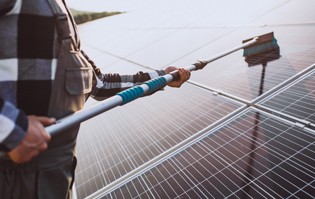Differences Between Deionized Water and Distilled Water for Solar Panel Cleaning Machines

In the realm of solar panel cleaning systems, the choice of water type is paramount for achieving optimal results. Two commonly used types of water are deionized water and distilled water. While both are often used interchangeably, they have distinct characteristics that can significantly impact the efficiency of cleaning processes. In this article, we'll delve into the dissimilarities between deionized water and distilled water, shedding light on their respective roles in solar panel maintenance.
Deionized Water
Deionized water, commonly abbreviated as DI water, undergoes a purification process to remove ions and minerals. This process involves passing water through ion exchange resins or membrane filters, effectively stripping it of charged particles. As a result, deionized water boasts a high level of purity, making it an ideal choice for various applications, including solar panel cleaning machines.
The absence of ions in deionized water prevents mineral buildup and streaking on solar panels, ensuring a pristine finish after cleaning. This purity also reduces the risk of corrosion and damage to delicate components of solar panel cleaning systems, prolonging their lifespan. Additionally, deionized water is highly effective in dissolving dirt, grime, and other contaminants, facilitating thorough cleaning without the need for harsh chemicals.
Distilled Water
Distilled water, on the other hand, is produced through the process of distillation, wherein water is heated to its boiling point, and the resulting steam is condensed back into liquid form. This process effectively removes impurities, including minerals, organic compounds, and contaminants, yielding a high level of purity similar to deionized water.
While distilled water shares similarities with deionized water in terms of purity, it may not be as consistently pure due to potential contamination during storage or transportation. Additionally, distilled water lacks the ion-exchange capability of deionized water, which means it may not be as effective in preventing mineral buildup and streaking on solar panels.
Choosing the Right Water for Solar Panel Cleaning Machines
When it comes to selecting the appropriate water type for solar panel cleaning systems, several factors should be considered. Firstly, the level of purity required for the cleaning process plays a crucial role. For applications where stringent purity standards are necessary, such as in the semiconductor industry, deionized water is often the preferred choice.
However, for general solar panel cleaning tasks, distilled water may suffice, provided that it meets the required purity standards and is stored and handled properly to prevent contamination. Additionally, factors such as cost, availability, and ease of procurement should also be taken into account when making the decision.
Conclusion
In summary, while both deionized water and distilled water offer high levels of purity suitable for solar panel cleaning machines, they differ in their methods of purification and effectiveness in preventing mineral buildup and streaking. Understanding these differences is essential for selecting the most appropriate water type for specific cleaning applications.
By incorporating the insights provided in this article, solar panel maintenance professionals can make informed decisions regarding the use of deionized water or distilled water in their cleaning processes. Ultimately, choosing the right water type can contribute to the efficiency, longevity, and performance of solar panel cleaning systems, thereby maximizing the return on investment in solar energy infrastructure.
In case you are looking for a solution to purify the water for solar panel cleaning, contact us and we will help to find the best solution for your needs.

